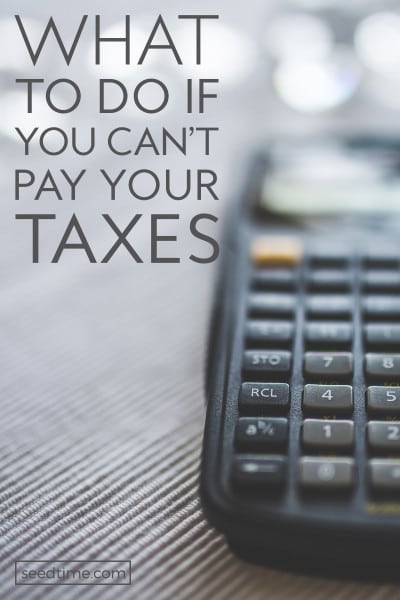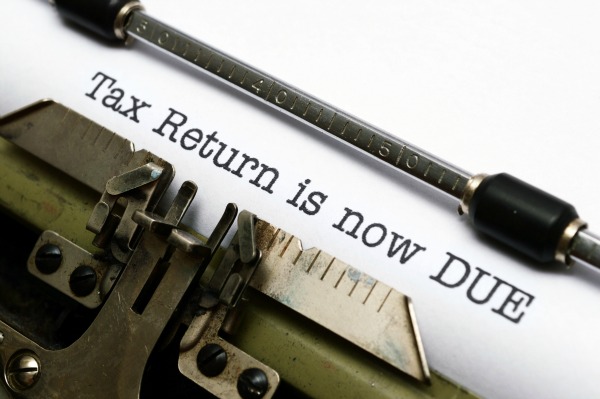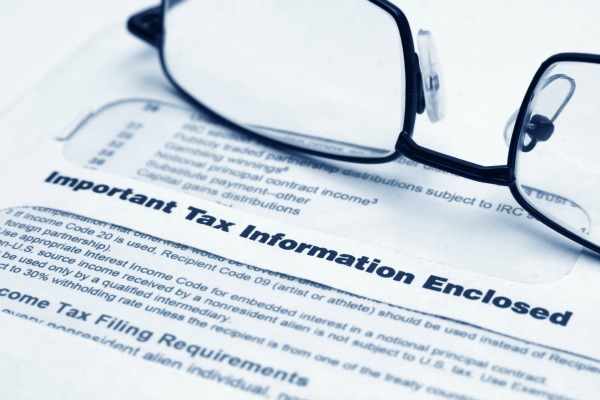 April 15 will be here before we know it.
April 15 will be here before we know it.
For those of us who owe taxes, that date comes too soon each year.
If you’re someone who owes taxes this year, hopefully you don’t owe that much.
But what if you do? What if you owe so much that you can’t pay your taxes by April 15?
First, don’t panic. You have options. Here’s what to do if you can’t pay your taxes.
File Your Tax Return, Even if You Can’t Pay
The worst thing you can do is run away from your problem. That will only make it worse.
Be sure to file your tax return by April 15, even if you can’t pay. If you don’t file, you will incur late filing fees, which can add up quickly. If you file more than 60 days late, that fee is a minimum of $135 or 100% of your unpaid tax!
Pay as Much as You Can
Maybe you can’t pay your entire tax bill but pay as much as you can. The late payment penalty, which is separate from the late filing fee, accrues at .05% of your unpaid taxes every month.
The less you have in unpaid taxes, the less you’ll pay in penalties.
Fortunately, the late payment penalty is capped at 25% of your unpaid taxes. Your combined late filing and late payment penalties cannot exceed more than 5% of your unpaid taxes per month.
Still, it’s best to minimize the penalties, and the best way to do so is to pay as much of your tax on time as you can.
Ask for a Short Term Extension to Pay

If you anticipate that you will be able to pay your tax bill in full within four months, ask the IRS for additional time to pay.
In order to qualify for this short-term extension, you must owe less than $100,000, and you must have filed your tax return.
There is no user fee for this short term payment plan, but penalties and interest will continue to accrue until your taxes are paid.
To apply, complete the online payment agreement.
Apply for an Installment Agreement
If you owe less than $50,000 in combined taxes, fines, and penalties, and you will take more than four months to pay, you can apply for a formal installment payment plan.
An installment plan will typically give you up to 72 months (more in unusual circumstances) to pay your taxes. Penalties and interest will continue to accrue until your account is paid in full.
In addition, you will incur a $120 installment agreement user fee for a standard installment agreement or a payroll deduction plan. If you opt to pay by direct debit from your bank account, the user fee is reduced to $52. And if you meet certain income guidelines, it may be further reduced to $43.
To apply, complete the online payment agreement and file form 9465, the Installment Agreement Request (PDF).
Use a Low-Interest Credit Card

If you can find a credit card with a zero percent introductory rate and you are absolutely confident that you can pay off your taxes before your rate goes up, paying taxes with a credit card might be a good idea.
However, you must be incredibly disciplined, or you may end up in worse shape than if you had entered an installment agreement with the IRS.
If you don’t pay off your card, the interest rate will end up being much higher than what the IRS would charge you. Use this option with care. It’s only worth it if the bill is paid before interest begins to accrue.
Take on a Side Hustle
However you decide to pay your taxes, the faster you can pay them off, the better off you’ll be.
While you have tax debt, take on any odd job you can find and put the money toward your tax bill. Have a garage sale and use the proceeds to pay your taxes. Sell your books on Amazon. Cut expenses any way you can.
Every little bit you pay will reduce your interest and penalties. And I don’t know about you, but I don’t want to pay the IRS any more than I have to!
Make an Offer in Compromise

If you can’t even afford installment payments, you might consider making the IRS an Offer in Compromise (OIC).
If approved, the IRS will agree to accept a payment that is less than what you owe. You will still have to pay fees, and you will need to stay current on your taxes for the next five years.
It is somewhat rare for the IRS to accept an OIC, but if you really can’t pay your full tax amount, it may be worth a try.
To find out if you are eligible to submit an OIC, take the pre-qualification quiz on the IRS website.
Look Ahead to Next Year’s Taxes
Now that you have a plan to pay your taxes this year, take a moment to assess your finances, so you don’t face the same problem next year.
If you are employed, you may need to adjust your withholding on your W-4 form. Make sure your employer is holding enough money out of your paycheck to fully cover your taxes next year.
Pay your quarterly estimated taxes if you are self-employed. Your tax-preparation software will calculate the amount you need to pay each quarter to avoid an underpayment penalty next year.
If you didn’t use a tax preparation software, divide your total tax liability this year by four and pay that much each quarter.
Not being able to pay your taxes can really put you in a financial bind. Deal with your situation this year. Then take the steps necessary to prevent underpaying your taxes next year. You’ll be glad you did.




